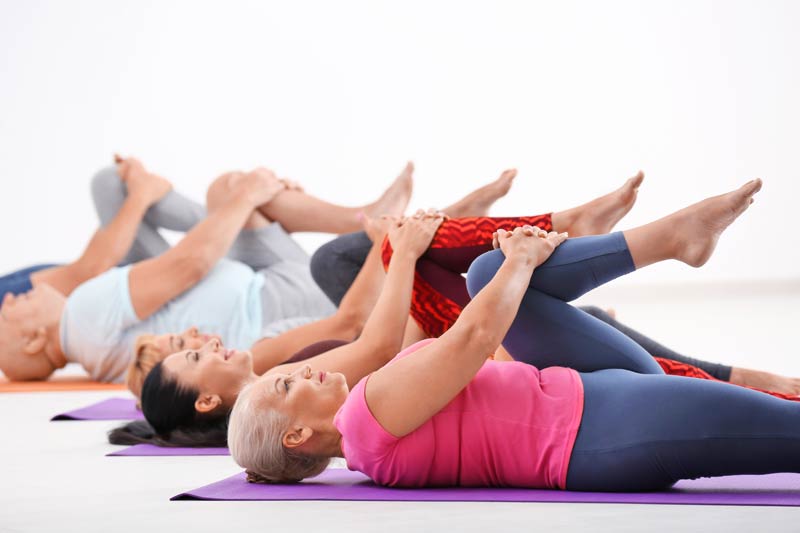
Yoga may be right for you if you are a large person with low self-esteem. Yoga can benefit anyone regardless of their size. These tips will help you start your journey to yoga. First, make sure you find a studio that offers classes tailored to your physical needs. You will find classes that suit your needs, whether you are looking for a class that is a workout or a more relaxed atmosphere.
Poses to increase flexibility
Hatha yoga and yin yoga are excellent options for overweight people. These are both great options for obese people. However, you can adapt them to your needs. Poses that require slowing down are easier for people with different physical conditions. Forward fold poses, for example, stretch the hamstrings while releasing the lower back. To maintain balance, you must relax your neck and shoulders.
Half forward bend is the best way to increase your flexibility. To do this, stand and stretch your hands forward, palms facing each other. Your right leg should be straightened and your right hand should reach to your right shin. Hold this pose for thirty seconds and then switch sides. This will strengthen your core and quadriceps. Another pose that increases flexibility for fat people is the Extended Side Angle. You can do this by bending your left leg at the knee and stepping back.
Methods to Find a Class

You don't have to be a ripped celebrity to take a yoga class, and you don't need to wear stretchy spandex pants to enjoy the benefits of this ancient exercise. Yoga is for everyone regardless of size. This ancient practice has been beneficial to people of all races, genders, sizes, and cultures for thousands of years. It doesn't just benefit people who are of a certain body type. So, you can find a class that is suitable for you regardless of your weight. Even if you're morbidly obese, you can still practice yoga to improve your flexibility and health.
Fat Yoga classes are popping up all over the world, from Sydney to Melbourne. Even Hepburn Springs in Victoria hosts retreats. If you don't feel comfortable joining a class, you can try online reviews and Facebook pages to get a feel for what the other participants have to say. If you feel confident you can try the class out yourself. Many studios offer pictures that you can view to get a sense of the class.
Plus-sized yogis are stigmatized
Yoga is not for everyone. Plus-size people are often stigmatized. Plus-sized women have to face stereotypes about yoga and other forms of exercise. Penningtons' campaign seeks to end the stigma attached to these women and show that you can exercise and do yoga regardless of your body size. Here are some tips for how to overcome the stigma of plus-size Yogis.
We first looked at the perceptions of stigma using two methods: obesity and body mass. It was clear that body mass is directly related to perceived stigma. While perceived stigma was not affected by the severity of psoriasis, it did affect perceptions of women with more body mass. Women with lower body mass were also less likely to experience body-stigma. This relationship was stronger for obese women.
Finding a studio that offers classes tailored to your body

It is important to find a yoga studio that offers classes that are tailored to your needs if you are looking for a yoga studio. Even though yoga poses can seem intimidating, many people are hesitant to take part in it because they lack the equipment or disabilities that will make it easier. This form of exercise can be difficult for people with neurological or physical limitations. There are many places that offer classes that can be tailored to your needs.
When searching for a yoga studio, you may find that you have a difficult time deciding which type of class to attend. A beginner's course is typically referred as a "level 1" class. This class is usually for those with limited mobility. You can also choose a gentler, more seated yoga class that is suitable for people with limited mobility. A yoga instructor can modify any pose to suit the student's limitations and body type.
FAQ
These are 5 ways to improve your well-being.
"Wellbeing" is defined as "the state that you are physically, mentally and spiritually happy." Our well-being is affected by many factors, including family, work and health. The first step in improving your well-being involves identifying the areas of your life that need improvement. Next, take steps to improve these aspects.
Here are five easy ways to improve your wellbeing
-
Exercise - Exercising makes you happier.
-
Sleep – Sleeping longer than 6 hours each night will reduce anxiety and stress.
-
Nutrition – Healthy foods such as fruits & vegetables can boost your mood.
-
Meditation - Regular meditation can reduce stress and anxiety.
-
Socialization – It's important to spend time with loved ones and make friends.
Why is it important to have a healthy mind?
Work, play. Learn. And love. Mental health refers only to our overall health. Mental health refers to the many factors that affect us daily, including our physical, psychological, spiritual, social, and environmental well-being. The good news? There are many ways to take care of yourself mentally. You don't have to do everything at once; just start somewhere!
Understanding where you are now is the first step to improving your mental health. Take this quiz and find out how much you're doing to support your mental wellbeing. If you're not satisfied with your results, you might consider making lifestyle changes.
Suppose you scored high, congratulations! Consider the following tips to improve and maintain your mental well-being.
-
Get enough sleep You can keep your brain sharp, energized and alert by getting enough sleep. The American Academy of Pediatrics (AAP) recommends that you get at least 7-8 hours of sleep each night.
-
Exercise Regularly. Exercise releases endorphins, which make you happier and less likely stress. Do 30 minutes exercise five times a weeks.
What causes mental health problems in adolescents?
Adolescence is a time when we start developing our identities. As individuals, we start to understand who we are and where we fit in the society.
It is also a time where we can make new friendships as well as romantic relationships. These experiences can cause stress.
Stress is normal. But if stress becomes more severe than usual, you should seek medical help.
Sometimes, it is not possible to handle everything on your own.
Support can come from family and friends during stressful times. You may find them able to offer support and help you deal with stress.
You could try meditation or exercise. Both can help with stress reduction.
You could also join a church or sports team. You will meet new people and make new friendships.
What are some signs of mental-emotional difficulties?
Any condition that causes distress or impairment to functioning is called a mental disorder. Anxiety, depression, schizophrenia, borderline personality disorder and obsessive compulsive disorder are all examples of mental disorders.
What effect does mental health have on my relationships?
Your mental state can impact every aspect of your personal and professional life. It impacts your ability to function properly at home, school, and work. You may also find it difficult to establish meaningful relationships because of mental health issues.
When you're dealing with a mental health condition, it's easy to isolate yourself from others. Because you feel that no one understands, you may avoid social situations.
You must remember that people want you to be around them. They just need to learn how to approach and approach you.
If you are having difficulty connecting with others, talk to them about it. Ask for their guidance and tell them how you feel.
How does mental illness affect our daily lives and daily activities?
Everyone is affected by mental illness at one time or another. The main difference between those who suffer from mental illness and others is that they don't seek help for it. Talk to someone if you feel something is not right. There are many methods to manage anxiety, depression, and stress. These include medication, therapy or exercise.
Statistics
- Similarly, for positive mental health, there is likely to be substantial agreement about some typical components (e.g., resilience to stress) 6, and controversy about more atypical components (e.g., career consolidation). (ncbi.nlm.nih.gov)
- According to the National Alliance of Mental Illness (NAMI), one in five Americans experiences mental health issues which translates to more than 40 million adults a year. (doctorondemand.com)
- Appropriate nutrition and exercise are likely among the most efficacious and cost-effective positive mental health interventions. (ncbi.nlm.nih.gov)
- It does have some influence, but not nearly as much as we might think, so focusing less on attaining wealth will likely make you happier (Aknin, Norton, & Dunn, 2009); (positivepsychology.com)
- Neuropsychiatric diseases are the leading cause of death and disability in the U.S., accounting for 18.7 percent of all years of potential lifespan loss and premature mortality.
External Links
How To
Why is mental health so important? And what steps can you take to improve it
Mental health refers both to your mind and your emotional well-being. It affects how you feel, think, act, relate to others, sleep, eat, work, learn, play, and enjoy life.
Everyone needs to be aware of the importance of mental health. When we refer to mental health, we often refer to depression. Depression is a severe illness that affects millions every year.
Clinical depression is also known for its severity and requires that treatment be provided by a doctor. However, there are many types of depression, including milder forms that do not require medical intervention.
According to the National Institute of Mental Health (NIMH), depression can be described as "a common mood disorder characterized in a depressed mood most of a day almost every day, loss of interests or pleasures in almost all activities and feelings of guilt or low-self-worth, disturbed sleeping or appetite, poor coordination, thoughts of death or suicidal thoughts or actions."
Many people can experience depression in many different ways. Some may feel sad, hopeless, irritable, anxious, guilty, worthless, tired, unmotivated, and unable to concentrate. Others may feel empty and unmotivated. Some may feel nothing.
Depression can be treated. There are many treatments for depression, including medication, psychotherapy as well as diet and lifestyle modifications that can help. If left untreated, however, depression can cause problems at home, school, work, and in relationships.
Depression is more common in females than in men. However, both men and women can be affected. Depression is the leading cause worldwide of disability among men and woman aged 15 to 44.